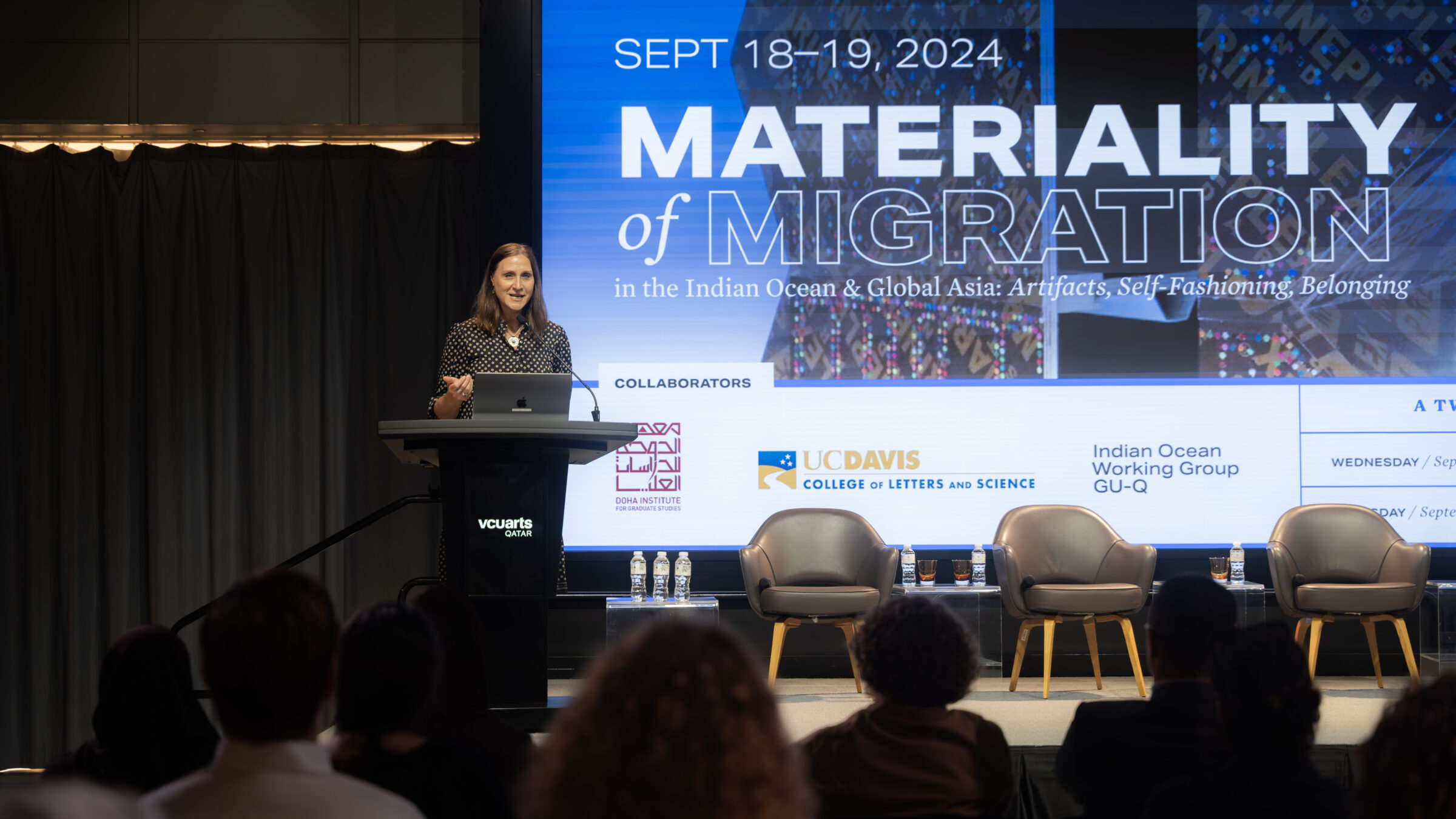- Academics
- Admissions & Enrollment Services
- Research
- Academic & Creative Spaces
- Strategic Partnerships
- Our Impact
- Student Affairs
- Campus & Community
VCUarts Qatar at the 2025 London Design Biennale - June 5–29, 2025
VCUarts Qatar’s GA:MA Lab Spearheads International Colloquium Exploring Migration and its Influence on Material Culture
October 9, 2024
Categories

“How do the objects that migrants carry with them on their journeys connect them to the places and peoples they’ve left behind?”
“How do these objects help ease the feelings of unease, unfamiliarity, and otherness, thus creating new meanings and ways of being in new places?”
“What stories of migration are made possible by tracing the histories of unwritten things that carry great meaning, value, and security for migrants?”
These were just some of the questions explored at an international colloquium held at VCUarts Qatar recently.
Titled “Materiality of Migration in the Indian Ocean and Global Asia: Artifacts, Self-Fashioning, Belonging”, the colloquium was spearheaded by GA:MA Lab. GA:MA is an abbreviation for Global Asia: Mobilities and Arts. The research lab is under the Institute for Creative Research at VCUarts Qatar.
The Lab collaborated with the Doha Institute for Graduate Studies, The Indian Ocean Study Group at Georgetown University in Qatar (GU-Q), and the University of California Davis (UC Davis) in the US to organize the colloquium. The event was held over two days, with the first day held at VCUarts Qatar and the second at the Doha Institute for Graduate Studies.
The conference aimed to uncover the unwritten histories of migration through the material culture that people most valued and brought with them as they traversed the space of the Indian Ocean world and beyond.
The principal investigators of GA:MA Lab are Neelima Jeychandran, Ph.D. and Monica Merlin Ph.D., from the Department of Art History at VCUarts Qatar.

Merlin said, “The GA:MA Lab works to create a strong global network of researchers, artists, and curators who contribute to the understanding of mobility in its many forms, such as migration and displacement, and its intersection with visual and material cultures as well as creativity. In this critical moment for international and regional geopolitics, this work feels more needed than ever.”
Presenters included scholars and researchers from VCUarts Qatar; GU-Q, UC Davis; Doha Institute for Graduate Studies; University of Oxford; Nieuwe Instituut, Rotterdam; Savvy Contemporary, Berlin; Art Institute of Chicago; Northwestern University in Qatar (NU-Q); University of Western Ontario, US; University of Amsterdam; IIT Madras, India; and the Christian Michelsen Institute, Norway.
On the first day, Amir Berbic, Dean of VCUarts Qatar, welcomed the gathering with the words, “Located on the edge of Asia, close to Africa and the Mediterranean, the GA:MA Lab explores what ‘Global Asia’ means by looking at how Asian cultures intersect with the rest of the world.
Today marks the first of, I expect, many opportunities for the GA:MA Lab to bring us together for discussions around this fascinating topic.”
He also noted, “Migration is not just a movement of people; it is a profound transformation that reshapes both the lives of individuals and the material landscapes they inhabit. Whether through the migration of tangible objects, the adaptation of living spaces, or the ways in which material goods embody cultural identity and memory, the materiality of migration offers endless avenues for exploration.”

The topics explored on the first day ranged from the links between Indian Ocean cultures and Doha Deco architecture, and the transfer of knowledge systems across the coastal regions of Africa and Asia to the influence of memory and media in post-revolutionary Nepal. Two films titled ‘Dongducheon New Town’ (2023) and ‘No Pain No Gain’ (2022), by Che Onejoon, a renowned Korean filmmaker and researcher, were screened at the end of day one, followed by a conversation with him.
On the second day, at the Doha Institute for Graduate Studies, the speakers covered topics such as knowledge production in multigenerational Palestinian-Syrian displacement; jewelry as identity; the cultural syntheses that led to the popularity of karak, a spiced tea preparation; and early Chinese settlements and community building in the southwest Indian Ocean, to name a few.
Jeychandran, noting how the colloquium attracted speakers from all over the world, said, “We are very proud to have brought 20 exceptional and inspiring speakers, including 11 who traveled from abroad to Doha for our two-day colloquium, Materiality of Migration. Together with local institutions and presenters from VCUarts Qatar, the Doha Institute for Graduate Studies, Georgetown University in Qatar, and Qatar Museums, we have initiated new conversations and laid the foundation for future collaborative and interdisciplinary research that extends from Doha to the world.”
The event at VCUarts Qatar and the Doha Institute for Graduate Studies was the first leg of the international colloquium. The second leg will be held in Davis, California, in December 2024.

